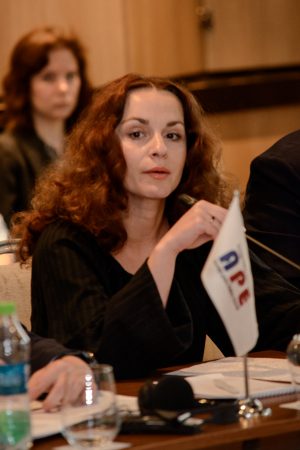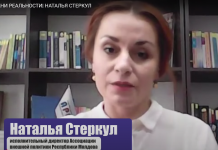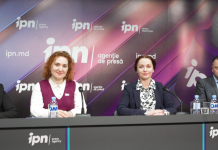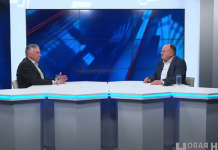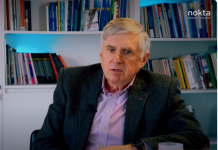Natalia Stercul, Foreign Policy Association of Moldova
«Coronavirus crush: Disinformation Resilience of the EaP states and Romania» – a regional research project conducted by the Foreign Policy Council Ukrainian Prism presents an overview of the COVID-19 related actions and communication strategies, as well the disinformation narratives in the Eastern Partnership countries and Romania. The study aims at raising awareness of broad audience about possible threats of disinformation activities linked to COVID-19 and state resilience. The analysis is structured around three main components: country chapters, disinformation narratives, and the Disinformation Resilience Index 2020. The main findings about Moldova were highly politicization of the pandemic response, misinformation and manipulation of the information, increasing the number of disinformation narratives, influence of geopolitical discourse on the Moldova’s socio-political landscape.
The current outbreak situation updated the whole spectrum of the substantial questions for the Republic of Moldova. Among the top issues, include different problem aspects as health, lifestyle in self-isolation, recommendation of the World Health Organization, health insurance problems; the economic effects of the state of emergency, respecting the human rights; the political “colors” of international assistance in times of pandemic.
The Russian information sources continue to exert an obvious manipulative influence in the region. The most exposed groups to manipulation are ethnic minorities (the loyal users of the Russian media products), the Orthodox churchgoers, and the older generation. The abundance of dis- and misinformation, conspiracy theories and fake news that has flooded the Moldovan media space in general and the online platforms in particular generated a chaotic information environment.
Moldova in the 2020 World Press Freedom Index ranked 91th, falling 11 places compared to 2017. The biggest concern of the Moldovan media landscape is the domination of the Russian broadcasts. The prevalence of the Russian TV content creates additional possibilities for the spread of Russian disinformation. The foreign influence campaigns have been the subject of close political and media attention, due to the use of fake news, propaganda, disinformation and fake documents. These campaigns are conducted in order to polarize societies on sensitive issues.
The narratives of such category of disinformation as the geopolitical preferences, polarization and political manipulations during the pandemic are exploiting the ongoing tensions in the Moldovan society. In the country, the main socio-political driver behind the pro-Kremlin discussions is the feeling of insecurity, which is based on current international environment and geopolitical contradictions between East and West. The myth that authoritarian regimes such Russia and China are dealing with Covid-19 much better than democratic ones are repeated again and constantly. The death came from the West, and help – from Russia and China: the coronavirus proved who the Moldova’s friends are. It promotes a narrative of the EU’s failing efforts in fighting the pandemic unlikeness to the successful Russian outbreak management.
In order to spread awareness about the Russian manipulative campaign against Western countries, the Moldova’s social media has provided regularly updated information about Russia disinformation. Analyses conducted by local media outlets emphasize that fake news labs in the Russian Federation have used various misleading information about the Covid-19 pandemic on social media, to launch a wide-scale disinformation campaign toward against the US and EU, that have influenced the Republic of Moldova too.
The information manipulation campaigns about Covid-19 infection comprise a range format of communication and messages, to reach a target audience, including news, blog posts, and comments on articles or social media posts, fake profiles of alleged influencers, TV reports, documentation, Facebook, Twitter, YouTube videos and others.
The most noteworthy problem was a number of online sources considered to spread fake news, which have been blocked by the Moldovan authorities. In accordance with the Extraordinary National Commission’ Decision from 23 March 2020, providers of publicly available electronic communications services by the decision of National Regulatory Agency for Electronic Communications and Information Technology, based on the list of online sources that Moldovan Security and Intelligence Service (SIS) published, have to block immediately online sources spreading fake news about the COVID-19 evolution.
All countries of the EaP region faced a similar problem of balancing between the necessity to prevent the spread of the disinformation, blocking some news or online sources, other to ensure the right of freedom of speech and media. However, the level of governmental criticism was arguably correlated to a level of democracy in the respective countries and trust in governmental actions. For instance, in Azerbaijan and Belarus there have been numerous previous cases of misuse of power and use of blocking as a punishment for the opposition, so any new restrictions were perceived through the lens of additional pressure. Whereas in Ukraine, the public accepted the necessity to block some Facebook pages by security services as a necessary step to prevent disinformation spread, as previously such actions have been predominantly connected to preventing Russian or separatist propaganda. Romania, Ukraine, and Georgia ranked the highest in terms of resilience, society and governmental response, although still did not reach the top marks. At the same time as, Azerbaijan, Belarus, and Moldova scored the lowest.
The most demanding issues are concerning the privacy of people during the lockdown, the spread of disinformation and the dangerous misconceptions regarding the virus in the online and social media networks, as well as the increase of internet scams.
The free flow of information is more essential than ever in amid of Covid-19 pandemic, ensuring open dialogue and the exchange of reliable information. It is necessary to respect and guarantee provisions of the Constitution and relevant laws concerning freedom of speech and media without violations and suppression. Leadership, as well as media outlets, and IT technology companies need to cooperate to counter misinformation with accurate, clear and evidence-based proofs. The lack of the media sector sustainability demands the elaboration of an action plan on disinformation with concrete media-points about fact-checking and diversifying media content. The Moldova’s legislative framework needs to be adjusted to the emerging threats related to the information security and provide raging control mechanisms to ensure adequate countermeasures in this field. Media outlets should invest more in fact checking and the most important social media platforms should have certificated fact checkers. It is necessary to support a strong quality media and digital environment, to develop media literacy and innovative forms of journalism.
The project was implemented by the Foreign Policy Council Ukrainian PRISM with the support of Black Sea Trust for Regional Cooperation. Foreign Policy Association was the regional partner in Moldova.


